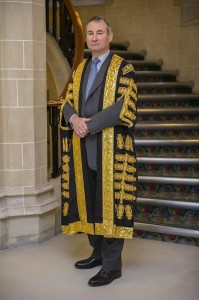Share it
 This week marks the end of Lord Hughes’ first term in the Supreme Court. He formally was appointed a Supreme Court justice last month alongside Lord Toulson. Lord Hughes succeeded Lord Dyson, who became Master of the Rolls in October 2012.
This week marks the end of Lord Hughes’ first term in the Supreme Court. He formally was appointed a Supreme Court justice last month alongside Lord Toulson. Lord Hughes succeeded Lord Dyson, who became Master of the Rolls in October 2012.
Legal career
Born on 11 August 1948 in St Albans, Anthony Philip Gilson Hughes was educated at Tettenhall College. Lord Hughes graduated in 1969 with a law degree from Van Mildert College, Durham. He went on to lecture law at both Durham University and Queen Mary College, London.Lord Hughes was called to the Bar by the Honourable Society of the Inner Temple in 1970 and was appointed a Recorder of the Crown Court from 1985 to 1997. He took silk in 1990 and was head of No.1 Fountain Chambers in Birmingham until 1997.
In 1997, Lord Hughes was appointed as a judge in the Family Division of the High Court until 2003. He also acted as Presiding Judge on the Midland Circuit between 2000 and 2004. In 2004, he was assigned to the Queen’s Bench Division in order to gain experience of mainstream High Court work before being promoted to the Court of Appeal in 2006.
Lord Hughes has been Vice President of the Criminal Division of the Court of Appeal since 2009. Indeed, it is hoped that he will bring criminal expertise to the Supreme Court, which traditionally lacks experience in this area. In 2008, Lord Hughes became particularly well known outside legal circles for his judgment in R v Bassett (Kevin) [2008] EWCA Crim 1174, in which he held that the offence of “voyeurism” under the Sexual Offences Act 2003 does not extend to the observation of the exposed male chest.
Lord Hughes has a particular interest in developing and monitoring sentencing guidelines as the Deputy Chairman of the Sentencing Council. He has attracted controversy for reducing jail sentences in a number of high-profile Court of Appeal cases, including R v Owen (Jason) [2009] EWCA Crim 2259, commonly known as the ‘Baby P’ case. However, in a lecture on judicial independence in 2011 for the Honourable Society of the Inner Temple, Lord Hughes reiterated the importance of consistent sentencing and following guidelines as laid out in law. He stated that “if you are a judge passing sentence, sometimes you might possibly wish that the statutory sentencing powers were different, you might wish that the maximum was higher or that the guidelines were lower. Being independent does not mean that you are free to use your court as a place to ventilate your private views. It actually means that you are not free to do it.”
Lord Hughes’ contribution to the legal world has been recognised by his knighthood in 1997 and an honorary LLD from the University of Birmingham in 2008.
Personal life
Lord Hughes married his wife Susan in 1972 with whom he has a daughter named Clare who is a vet in Cornwall, and a son named Richard who studied oceanography. He lives with his wife in Ombersley, Worcestershire where he is a member of Worcester Rowing Club. He also spends time in London and is a member of The Athenaeum Club in Pall Mall. Lord Hughes enjoys gardening, mechanics and the unusual hobby of bellringing.
Appointment to the Supreme Court
Speaking of his appointment last month, Lord Hughes said: “This is a great honour for me. I look forward to the challenge.” In his first term in the Supreme Court, he has sat on the panel for a case from Northern Ireland concerning the admissibility of electronic fingerprinting as evidence, a case concerning overlapping statutory powers granted to a local authority and a case concerning equal pay.
Lord Hughes now also sits on the Judicial Committee of the Privy Council, which serves as the court of final appeal for the UK overseas territories, Crown dependencies and for certain Commonwealth countries.



1 comment
Simon said:
05/12/2016 at 19:06
The same Hughes who was on the Brexit bench? It’s a shame we can’t apply retroactive laws because of the EU law. Of course if we voted out of the EU…